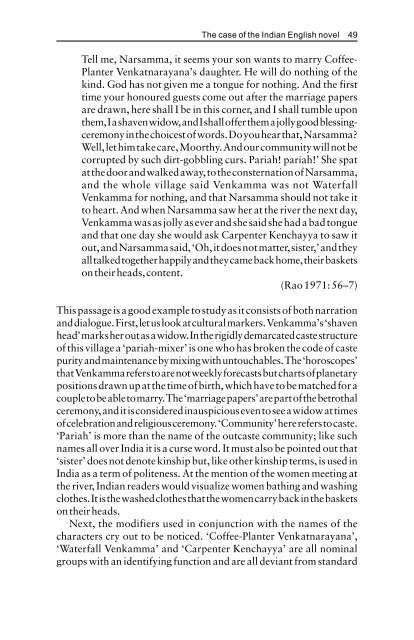post-colonial_translation
post-colonial_translation
post-colonial_translation
Create successful ePaper yourself
Turn your PDF publications into a flip-book with our unique Google optimized e-Paper software.
The case of the Indian English novel 49<br />
Tell me, Narsamma, it seems your son wants to marry Coffee-<br />
Planter Venkatnarayana’s daughter. He will do nothing of the<br />
kind. God has not given me a tongue for nothing. And the first<br />
time your honoured guests come out after the marriage papers<br />
are drawn, here shall I be in this corner, and I shall tumble upon<br />
them, I a shaven widow, and I shall offer them a jolly good blessingceremony<br />
in the choicest of words. Do you hear that, Narsamma<br />
Well, let him take care, Moorthy. And our community will not be<br />
corrupted by such dirt-gobbling curs. Pariah! pariah!’ She spat<br />
at the door and walked away, to the consternation of Narsamma,<br />
and the whole village said Venkamma was not Waterfall<br />
Venkamma for nothing, and that Narsamma should not take it<br />
to heart. And when Narsamma saw her at the river the next day,<br />
Venkamma was as jolly as ever and she said she had a bad tongue<br />
and that one day she would ask Carpenter Kenchayya to saw it<br />
out, and Narsamma said, ‘Oh, it does not matter, sister,’ and they<br />
all talked together happily and they came back home, their baskets<br />
on their heads, content.<br />
(Rao 1971: 56–7)<br />
This passage is a good example to study as it consists of both narration<br />
and dialogue. First, let us look at cultural markers. Venkamma’s ‘shaven<br />
head’ marks her out as a widow. In the rigidly demarcated caste structure<br />
of this village a ‘pariah-mixer’ is one who has broken the code of caste<br />
purity and maintenance by mixing with untouchables. The ‘horoscopes’<br />
that Venkamma refers to are not weekly forecasts but charts of planetary<br />
positions drawn up at the time of birth, which have to be matched for a<br />
couple to be able to marry. The ‘marriage papers’ are part of the betrothal<br />
ceremony, and it is considered inauspicious even to see a widow at times<br />
of celebration and religious ceremony. ‘Community’ here refers to caste.<br />
‘Pariah’ is more than the name of the outcaste community; like such<br />
names all over India it is a curse word. It must also be pointed out that<br />
‘sister’ does not denote kinship but, like other kinship terms, is used in<br />
India as a term of politeness. At the mention of the women meeting at<br />
the river, Indian readers would visualize women bathing and washing<br />
clothes. It is the washed clothes that the women carry back in the baskets<br />
on their heads.<br />
Next, the modifiers used in conjunction with the names of the<br />
characters cry out to be noticed. ‘Coffee-Planter Venkatnarayana’,<br />
‘Waterfall Venkamma’ and ‘Carpenter Kenchayya’ are all nominal<br />
groups with an identifying function and are all deviant from standard


